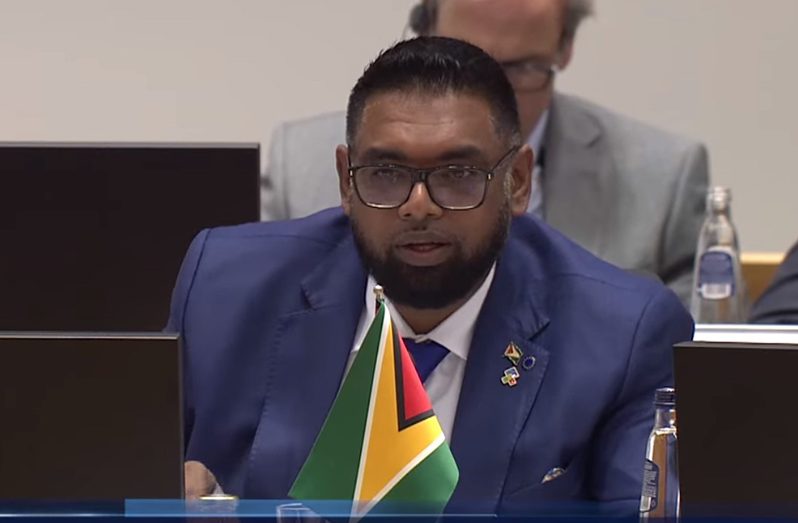–President Ali tells EU-CELAC partners
PRESIDENT, Dr. Irfaan Ali, on Tuesday, during his address to the European Union and Community of Latin American and Caribbean States (EU-CELAC) summit, called on stakeholders to have a frank and balanced approach to issues relating to energy transition and oil and gas.
The Head of State, during his address which was streamed by the News Room, questioned leaders as to what the joint energy strategy is and what the role of natural gas in their energy transition among the EU-CELAC is.
He went on to question if stakeholders are willing to have a frank and balanced approach to a discussion on oil and gas, and if the body is willing to invite all stakeholders to the table for these kinds of discussions.
“We cannot say that we want to find a common solution and lock out the producers of hydrocarbon from the discussion,” Dr. Ali said.
He further questioned how the EU-CELAC is going to have this balanced discussion on the energy mix required for the future, and subsequently went on to ask that if leaders are to say bring an end to hydrocarbon, who will determine who the producer of what is required will be?
It is for this reason that the Guyanese Head of State said that greater clarity is required on these topical issues among the EU-CELAC leaders. With that, he reminded the summit that Asia will spur the demand for oil and gas, as that region is growing and will outgrow the US and Europe by the end of the year.
Dr. Ali said that Guyana is providing great leadership on the environment, and some 20 per cent of the world’s oxygen is created by the Amazon jungle.
As such, he questioned when the EU is going to come on board in terms of being a purchaser of carbon credit and contributing to this market, since the bloc is not yet in this equation.
Guyana received the first TREES credits in history in December 2022 from the Architecture for REDD+ Transactions (ART); this was a significant occasion since it was the first time a nation received carbon credits created especially for the voluntary and compliant carbon markets for effectively halting forest loss and degradation (a procedure known as jurisdictional REDD+).
After passing the ART Board of Directors’ approval and the independent validation and verification process, ART issued 33.47 million TREES credits to Guyana for the five-year period from 2016 to 2020.
This also paved the way for a historic agreement between Hess Corporation and the Government of Guyana, whereby the oil giants opted to purchase about one-third of all Guyana’s credits (issued and anticipated) up to 2030.
The agreement will generate a minimum of US$750 million for Guyana over the coming decade and represent a major milestone on the journey towards a vision first set out in 2007.
Amidst the progress of Guyana and the region, following the EU-CELAC summit, the council made its declaration in which leaders committed to renewing and further strengthening the long standing-regional partnership, which was founded on shared values and interests.
Leaders further committed to reinforcing dialogue to foster extensive people-to-people contacts and reaffirmed that by working together, the body would be stronger to face the multiple crises and challenges like food insecurity, poverty, supply chain disruptions and rising inflation.
Additionally, it was noted in the declaration that the EU-CELAC will cooperate to mitigate the adverse effects of climate change and environmental degradation.



.jpg)








